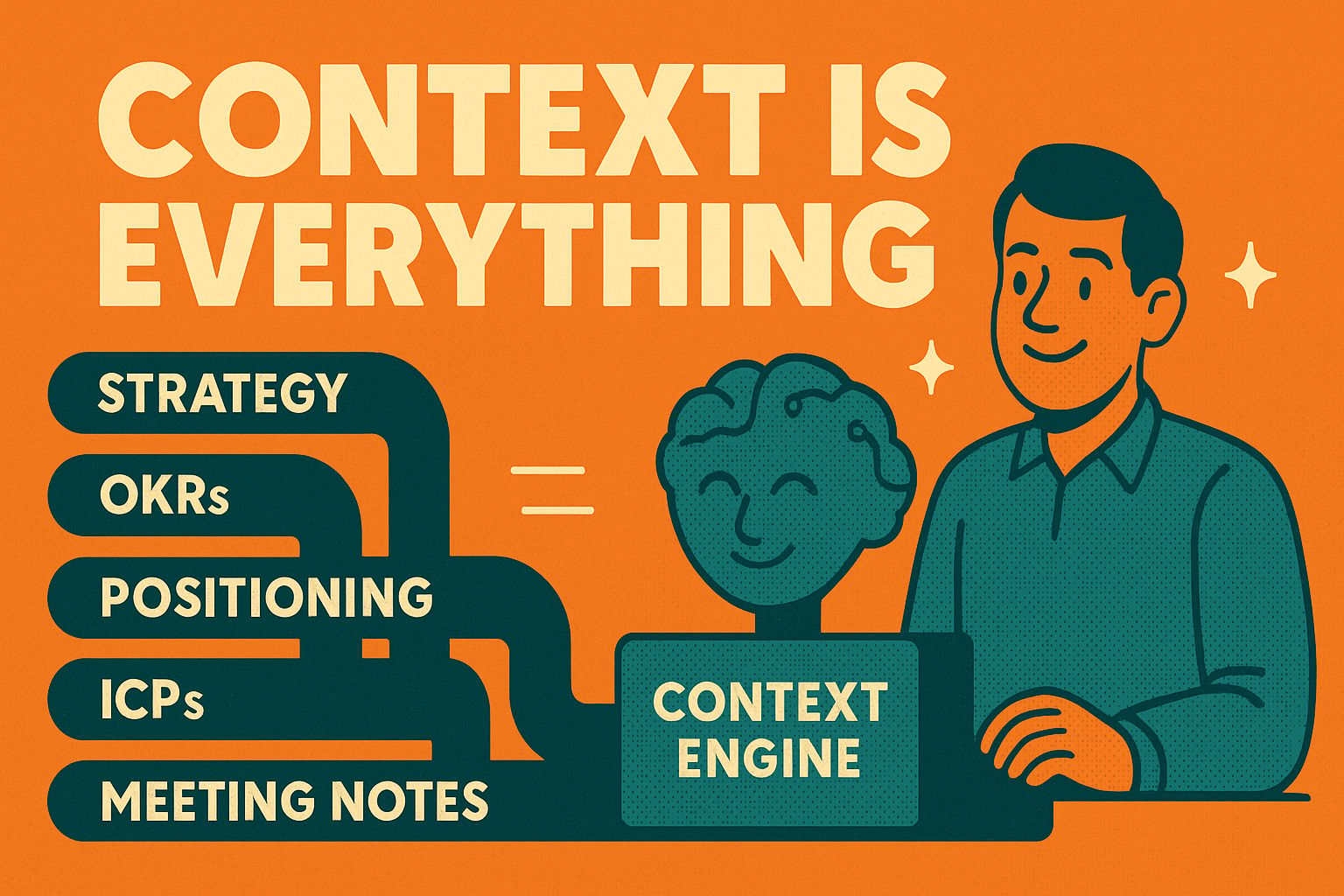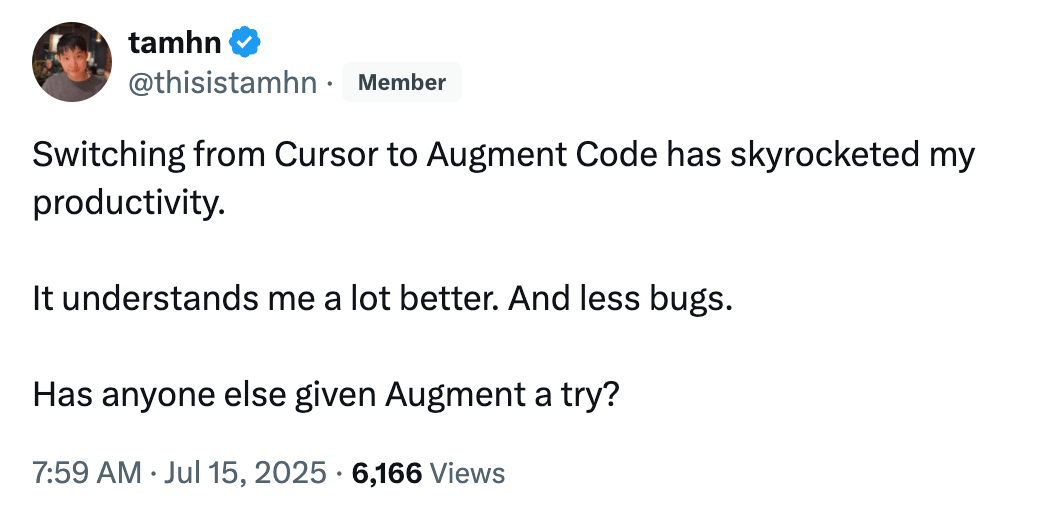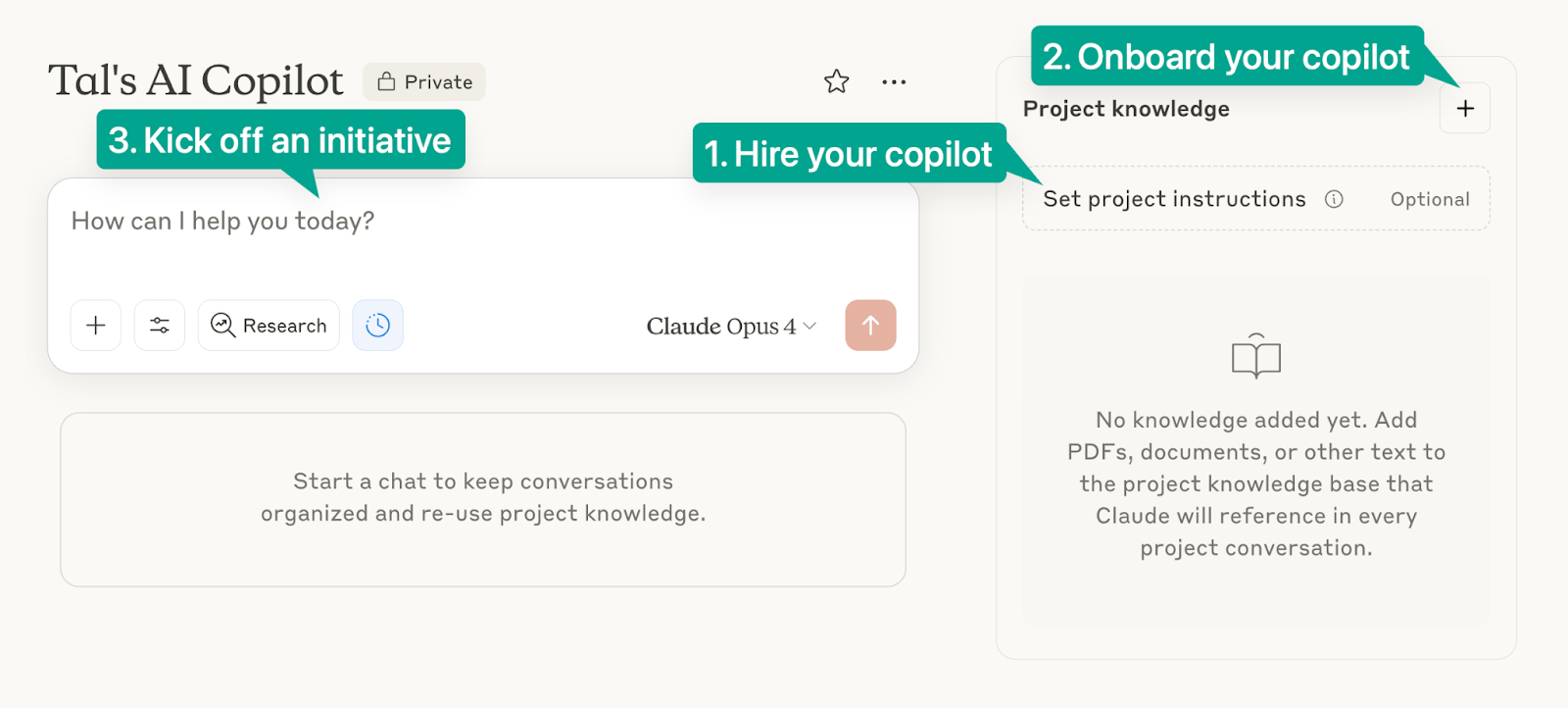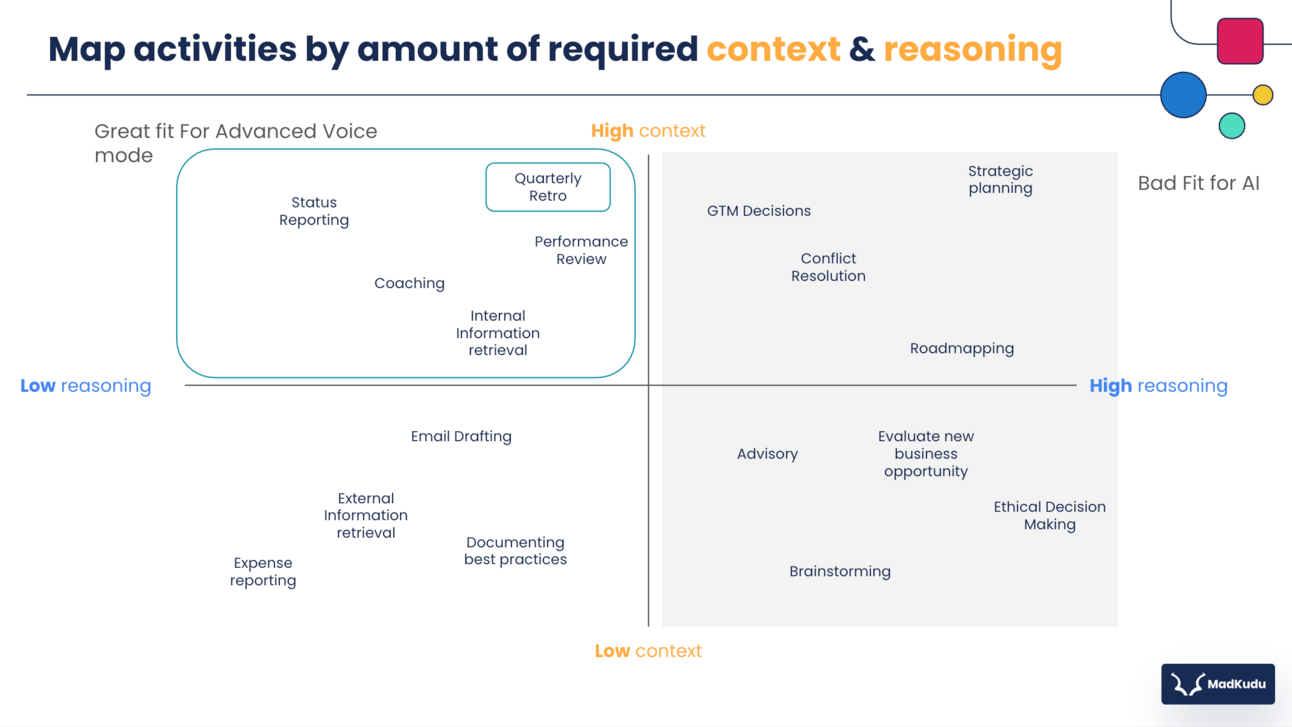- Francois' Highlights
- Posts
- Context and our AI Copilots
Context and our AI Copilots
Feeding our personal AI Copilot | Collecting context with Advanced Voice Mode | Invoking custom GPTs | How to Rank #1 in ChatGPT Results | What people are vibecoding | Unboxing Videos
Last week, I covered how marketers need to feed both the machines and humans differently.
A lot more keeps getting published about AI search optimization (AIO) and vibe coding following:
Cloudflare’s successful “Content Independence Day” campaign, where they revealed how website visits coming from search have been plummeting
Lovable's $200m series A and $1.8bn valuation that made vibecoding even more top of mind
You will find some of these resources in my selection of tips and resources this week and going forward.
This week, however, I'm first going back to what really makes AI work much better and harder for us: context. How to collect it, tap it and chain it.
And if you only check one highlight this week:
Don’t use projects with full context attached? First section: How to build and enrich your copilots with rich context.
Already use projects regularly? Section 2 to gather more context from others with advanced voice mode
Even more advanced than that? Section 3 how to chain multiple GPTs and keep context in one thread
-François
Context and Your AI Copilots
When underlying models are converging in performance and functionality, it’s access to rich context and the ability to focus on the most relevant context for a given task that makes the difference between:

generic AI outputs. They feel like they came from a smart and very well-read intern who just joined your team, and
outputs that feel like you're working with a strategic and tenured person on your team. An AI that feels like a strategic personal advisor who’s been with you for a while.
That's why building and maintaining your central marketing brain is so essential and using projects, with attached knowledge bases that act as that central context, is the easiest way to start.
Tal Raviv, whose article I’m featuring below, noted:
Regardless of company size, vertical, or fluency in AI, many tech workers today are missing out for the same reason I was. They’re not giving LLMs the context needed to experience their full potential.
We have seen it first-hand at Augment Code.
When most coding AI providers often use the same underlying LLMs from frontier Labs (Claude 4 being the leading one for code), it is the proprietary context engine that Augment’s AI research and engineering team has built that makes the critical difference.
It not only indexes a whole codebase and additional context around it, it also knows what to surface to the LLM at the right time to get the best outcomes, reduce hallucinations, and improve quality. That’s why these reactions are typical:

Okay, I'm going to stop beating on this dead horse 🐴💀.
You understand context matters now 😊
So how can you turn ChatGPT, Claude, or Gemini into an advanced personal and strategic AI assistants by bringing in the right context ?
This detailed step by step on how to use Projects to Build your personal AI copilot by Tal Raviv is a great place to start.

Setting Up a Project in Claude
tl;dr:
his AI Copilot Building Workflow?
Step 1: Create your project and define copilot personality/behaviors in instructions. Prompt in article.
Step 2: Upload company docs, strategy, research, key meeting notes as project knowledge base (the next section helps you collect more context easily from others with advanced voice mode)
Step 3: Start initiative-specific chat threads (e.g. let’s create a campaign for segment X) within that project
Step 4: Use simple conversational prompts and voice mode when possible.
Step 5 (optional): Ask your AI to recap all new or key info and save as PDF that you attach back to the central project
I recommend you follow these steps as a team when possible. CMOs or their chief of staff or head of PMM should lead the way:
Identify all helpful context - from corporate to marketing-level
Make it available to the team to add to their own personal assistants
Block time for the team to build their own and iterate
Ask all team members to report back and share outcomes and learnings
The upfront investment is so worth it.
Happy co-pilot context building!
My selection of tips, news and workflows
🛠️ Collect team or SME context with ChatGPT Advanced Voice Mode - improve QBRs and much more
Speaking of collecting context…
Want ChatGPT to interview others for you?
We can now quickly collect insights from people, by giving them a prompt that they drop into a new chat and having them switch to advanced voice mode to answer questions in the same thread.
The initial prompt you drop gives the AI an interview guide for the voice convo.
Francis Brero shared how he upgraded his Quarterly Business Reviews (QBRs) with that technique.
Results:
Deeper and faster insights from people.
Fewer meetings
Intraverts share just as much insights as loud voices
👉 You can use similar techniques to:
Run win-loss deal analysis with sales and SE teams - even collect feedback from prospects themselves
Interview reps to build detailed persona cards
Interview CSMs or customers to create case studies
Interview peers, direct reports, and manager to collect 360 performance assessments.
Interview SMEs for your content
Here’s the step by step of Francis' "distributed QBR" workflow:
1- RevOps: Prep the Context
Run end of Quarter reports (win/loss reports, win rates, sales cycle metrics…) by reps and feed them into ChatGPT
Output: a quarterly summary used to inject into their master prompt for every rep’s session
2- Leader: Create master prompt for rep interviews
Directs ChatGPT to ask about: key wins & misses, learnings + follow-up questions
3- Reps: Run Their Voice Retros individually
Rep pastes the master prompt seeded with the summary of their quarter in a new text chat. Then switch to advanced voice mode to speak freely and let ChatGPT ask follow-ups, gathers insights live
Output: full transcript + themes + top priorities that reps shares in Notion or G-docs for the manager
4- Leader: Curate & Challenge
Aggregate & summarize retro outputs, then ask ChatGPT to be challenged or ask clarifying follow-ups Identify learnings and implications and shares his/her thoughts
Output: Retro document ready to be shared with the team with references
5- Team: Review + Apply
Share rep-level insights back in 1:1s and team meeting. Synthesize team-wide themes for enablement. Feed learnings into next quarter’s priorities or playbooks
Here are Francis’ lightning talk, slides (with link to the prompts) and full article.

Where advanced voice mode will shine (top-left quadrant).
🧵Keeping context in a thread: Tap Multiple Custom GPTs in a single ChatGPT chat
I forgot that we could chain multiple Custom GPTs in a same chat to avoid losing context between tasks. We can do that using @mention with the name of our GPT.
Liza Adams shares this good reminder.
This requires building multiple Custom GPTs first to be valuable.
Example of the Research-to-Launch AI Workflow she suggests:
- Step 1: Research GPT gathers competitive intel
- Step 2: Pitch Deck GPT turns insights into slides outline and content
- Step 3: Press Release GPT drafts the announcement
- Step 4: CEO Digital twin GPT reviews in CEO's voice and style
👉 We can build “AI Assembly Lines” for our campaigns, but start with a well-built GPT before attempting chains.
🔍 How to Rank #1 in ChatGPT Results
Asia, SEO/AIO expert at Hubspot, shares her steps and advanced techniques for AIO in this episode: YouTube, Apple Podcast).
tl;dl:
AI Search Content Strategy Workflow:
Step 1: Know your personas intimately
Step 2: Set up AI-powered systems for content creation at scale
Step 3: Populate your content with unique firsthand customer data
Step 4: Focus on bottom-funnel, product-specific content
Step 5: Get brand mentions across LLM-cited websites (esp. Reddit, Quora and review sites)
Some of her most Original/Advanced Techniques
Customer Data Integration
Use your own customer success metrics in content
Example: "Manufacturing companies see 3x higher close rates"
Authority Arbitrage
Buy and build websites and inject co-citations since AI ignores domain authority (so far at least)
Target LLM-cited sites for mention opportunities
Account-Specific Content
Create dedicated pages for individual target companies
Hyper-personalize your content for specific prospects
🤖 What is getting vibecoded now
This podcast episode by NLW (YouTube - Apple Podcast) touches on some of the current limitations of vibe coding if you're not technical (or you're not using a visual programming platform like bubble to go from prototype to production-ready).
He also lists examples of the types of apps that people are vibe coding today if you are looking for ideas:
Work Productivity Tools:
Meeting prep automation, time tracking apps, chrome extensions, availability sharing tools, accomplishments trackers
Data & Analytics Applications:
Carb counters, marketing data dashboards, business intelligence tools, sales automation systems
Personal Life & Family Apps:
Exercise and wellness tracking apps, procrastination games, chores trackers and story generators for kids, parenting apps, family story creators
Content & Marketing Tools:
Photo enhancement for Airbnb hosts, greeting card generators, daily language learning newsletters
📺 AI Video: unboxing videos with Veo3 go viral
1️⃣ Someone starts a style AND the prompt.
2️⃣ Others riff on it.
» We have a new AI video meme trend.
Some of these ads are really well done (esp. this Ikea one - 👇). Check out the prompt in the comments.
This Veo 3 prompt is literally ~$100,000 VFX ad🤯
Prompt in comment
— Min Choi (@minchoi)
3:49 AM • Jul 21, 2025
Other examples of videos we can generate today:
by the CEO of Capsule with a Dropbox example (with Capsule).
by the CEO of Keyplay.io, with an ad where grandparents roast B2B marketing
Final Words
ChatGPT now processes 2.5 billion prompts daily and aims to match Google's search volume by year's end. When AI agents become your primary audience, every assumption about user experience, content design, and business models must be reconsidered.
Thanks for sharing these highlights with busy marketing leaders around you.🙏
Someone forwarded you this email? You can subscribe here.
François | LinkedIn
I'm a CMO, advisor, and "CMO Wingman". Yes, that's a thing :-). Ask my clients: in this AI era, CMOs need a strategic proactive advisor more than ever. I’m former CMO at Twilio, Augment Code, Apollo GraphQL, Decibel, Udacity and Head of Marketing for LinkedIn Talent Solutions.